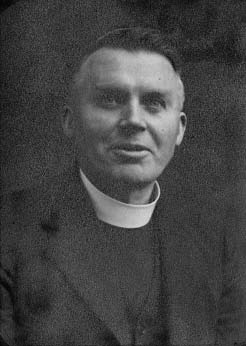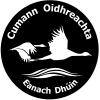
By Mary Forde (née Goaley), 1925-2018. When Br. Conal asked me for a memorandum for the Anach Cuain book I couldn’t think of an item to write about. I started looking through old photos and trying to resurrect ones that might be suitable. After some searching I found a person I could write about as when I pass on, other generations might like to know where this relation of mine stood in the family tree line. I write a few memories I have about my uncle Fr.Martin Goaley R.I.P. He was born on the 29th of October 1889 to Denis and Mary Goaley; the eighth member in a family of ten and the fifth son. Altogether there were six sons and four daughters in the Goaley family. He must have shown signs of his vocation when he was boarded in St. Jarlath’s in Tuam. His classmates there included Canon Curley in Claremorris and Canon Gunnigan who was President of St. Jarlath’s in later years. Another classmate of his was Sir John Sheehy, who was killed by bandits in Germany after World War Two. Sir John was an uncle of the well known Kitt family of T.Ds. Read more

Last summer it was my happy experience to find the home of one of my grandfathers over in the heart of Merry England. I mentioned the circumstances at the time and by way of apology for further personal and family narrative will only say that justice and equity ought to be shown both sides of the house. In England I had no directions or information whatever, while in Ireland I had a letter brought with me from home, written by Patrick Collins to Mary Collins, my mother's mother, thirty-one years ago. The letter heading read Creggduff, Parish of Annahdown, County Galway, Ireland. The village lying seven miles to the northeast of Galway, was easily located on my map. Having reached the latter city on my way from Dublin, I continued on through the bare granite hills and over boggy stretches to the village of Creggduff. Read more
Mr Thomas Walsh called to Elwood's and accompanied by William Walsh drove through Annaghdown and to Walsh's place where my mother and other Cavanagh's were born and around the fields joining Mr Blake's (Landlords) property of over 300 acres. There is one historic romance on Mr Walsh's farm (formerly Cavanagh's). An oval or round little plot of land-surrounded by a high stone wall about two acres said to have been roofed in the time the Danes occupied Ireland. Leaving the main road to the right, I followed a little boreen about 10 yards and going down an incline and several steps of stone is a well containing pure spring water. This wall is surrounded by rock and the spring is said to come through from a quarry on the hill above. This is the same well that my mother, Mary, in her youth drew water from for the use of the house etc. Read more

This month marks the 90th anniversary of the death of Seamus Ó Maoildhia, or Seamus O'Mulloy, of Cloonboo. Born in 1881 to Seaghán Ó Maoildhia and Bríghid Ní Áinin, Seamus received only four years of formal education, but exhibited a keen interest in the Irish language from an early age. He was appointed as a teacher by Conradh na Gaeilge aged 19 years, teaching first in Ballaghderreen and later throughout Mayo, Sligo and Leitrim. He was acquainted through his work with Douglas Hyde, later first President of Ireland, and assisted him greatly in collecting songs and stories at the beginning of the Gaelic Revival. Read more
He was pictured in a well-known photograph in 1903 of nine of the best-known organizers for Conradh na Gaeilge, published in Na timirí i ré, tosaigh an Chonartha 1893-1927 (1990), by Donncha Ó Súilleabháin. It was reported in An Claidheamh Soluis, 2 September 1911, that he was 43 years old, that he had Irish from the cradle and that he gave great help to Douglas Hyde in collecting Raftery's songs. Thomas Meehan was born in Shankill on 12 November 1866, and Patrick Meehan, a labourer, and Margaret Collins were his parents. By the time his sister Julia was born on 16 May 1869, Patrick's occupation was given as 'landowner'. By the time of the 1901 census, he was a farmer with a large house. He was a widower, 67 years old, and he spoke Irish. Read more

The first of our Cavanagh family to arrive in New Zealand was William Cavanagh; he landed at Port Chalmers, Otago, on the 'Gill Blas' in 1856 and came from Melbourne, Australia. How he got to Melbourne and with who else I am yet to discover - I suspect he wouldn't have travelled alone. Although important to our family, William Cavanagh (1835-1873) is of greater importance to all of the Galway early settlers, as he was the first Irish Catholic to land in Otago, according to research carried out by Sean Brosnahan of the Otago Early Settlers Museum. Then, shortly after his arrival, he started an 'immigrant chain' that was to nominate many other Galway Catholics for passage to Otago and Southland. Read more
